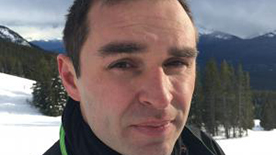
Andrew Jayich (Ph.D.’12 with Jack Harris) has been recognized with two prestigious honors a National Science Foundation (NSF) CAREER award on Rotational Cooling of Radioactive Molecules, as well as an award from the W. M. Keck Foundation. Jayich had previously won an NSF grant on “Developing a Radium Toolset for New Physics” (2019-2022).
The funds will enable him to expand his team and their equipment, making his grand experiments possible. Indeed, the group just published a paper in Physical Review Letters describing the first instance in which a radium ion was used to create a super precise optical clock. [Quoted from the UCSB Current (Feb. 9, 2022 Issue) article titled “High Risk, High Rewards”.]
The Faculty Early Career Development (CAREER) Program is a Foundation-wide activity that offers the National Science Foundation’s most prestigious awards in support of early-career faculty who have the potential to serve as academic role models in research and education and to lead advances in the mission of their department or organization. Activities pursued by early-career faculty should build a firm foundation for a lifetime of leadership in integrating education and research. NSF encourages submission of CAREER proposals from early-career faculty at all CAREER-eligible organizations and especially encourages women, members of underrepresented minority groups, and persons with disabilities to apply.
The W. M. Keck Foundation was established in 1957 in Los Angeles by William Myron Keck, founder of The Superior Oil Company. Our Foundation is one of the nation’s largest philanthropic organizations, with assets of more than $1 billion.
In recent years, the Foundation has focused on Science and Engineering Research; Medical Research; Undergraduate Education; and Southern California. Each of our grant programs invests in people and programs that are making a difference in the quality of life, now and for the future.
Supporting pioneering discoveries in science, engineering and medical research has been our mandate for a half-century. By funding the work of leading researchers, the establishment of unique laboratories and research centers, and the purchase of sophisticated instruments, we are laying the groundwork for breakthrough discoveries and new technologies that will save lives, provide innovative solutions to complex problems and add immeasurably to our understanding of life on Earth and our place in the universe.